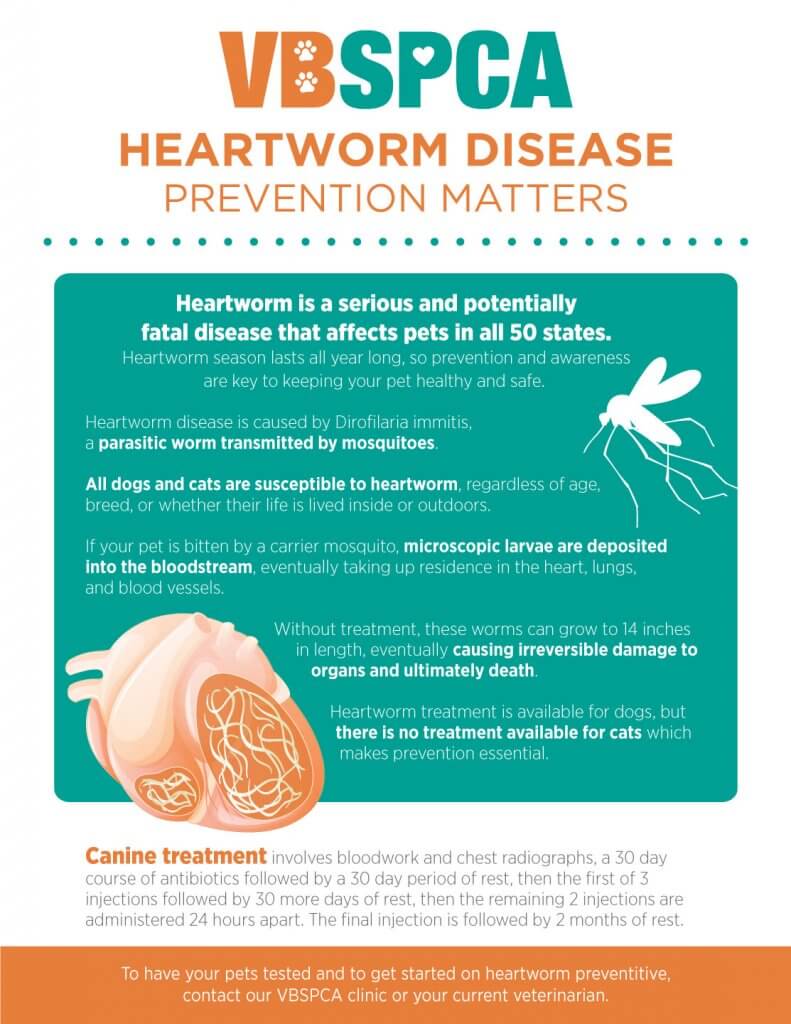As summer approaches, mosquito activity increases, and with more mosquitos comes a higher risk for heartworm disease. Now is the time to brush up on heartworm facts while also making sure your pets are protected from what is a very serious and life threatening situation.
What is heartworm disease? Heartworm disease is caused by Dirofilaria immitis, a parasitic worm transmitted by mosquitoes. If your pet is bitten by a carrier mosquito, microscopic larvae are deposited into the bloodstream, eventually taking up residence in the heart, lungs, and blood vessels. Without treatment, these worms can grow to 14 inches in length, eventually causing irreversible damage to the lungs and heart. Note that it only takes one bite for a dog or cat to be infected, and if your pet is not on prevention medication, your pet will contract the disease. Furthermore, just because you have an indoor pet does not mean there is an absence of risk.
The good news is that this disease can be avoided. There are a variety of heartworm prevention medications for both cats and dogs, and they are proven to be very effective when administered responsibly and correctly. However, if your pet has already contracted heartworm disease, treatment is only available for dogs. Sadly, there is not yet an approved treatment for heartworm positive cats, which makes feline heartworm prevention essential.
Over 20 different species of mosquitoes carry the parasite according to the American Heartworm Society, and they are active at different times of the day and year. Your pet should be on prevention year round.
If your canine is heartworm positive, treatment is serious and takes a minimum of 4 months to complete. It involves bloodwork, chest radiographs, and periods of prescribed rest. The rest is critical because if the heart rate is increased by exercise or excitement, the pieces of the dead worms can be forced into the blood vessels of the lungs, causing a potentially fatal pulmonary embolism.
It is recommended to have your pet tested annually. Heartworms can live for months before symptoms present themselves, and when they do show up, they can often be attributed to other ailments. This means that many pet parents have no idea their animal is heartworm positive. Fortunately, heartworm tests are quick and convenient, and you can access a test via our Walk-In Vaccine Clinic or through your current veterinarian. For a full list of our services, click here.
Over 1 million dogs in the U.S. currently have heartworm disease, and this number does not take into account animals not regularly tested or seen by a vet. Please ensure your pet is protected.
This article relied on information provided by the American Heartworm Society. Visit their website for more information.


Last Updated: May 1, 2025 by vbspcaadmin
Heartworm Disease: Prevention Matters
As summer approaches, mosquito activity increases, and with more mosquitos comes a higher risk for heartworm disease. Now is the time to brush up on heartworm facts while also making sure your pets are protected from what is a very serious and life threatening situation.
What is heartworm disease? Heartworm disease is caused by Dirofilaria immitis, a parasitic worm transmitted by mosquitoes. If your pet is bitten by a carrier mosquito, microscopic larvae are deposited into the bloodstream, eventually taking up residence in the heart, lungs, and blood vessels. Without treatment, these worms can grow to 14 inches in length, eventually causing irreversible damage to the lungs and heart. Note that it only takes one bite for a dog or cat to be infected, and if your pet is not on prevention medication, your pet will contract the disease. Furthermore, just because you have an indoor pet does not mean there is an absence of risk.
To download our Infographic, click here.
The good news is that this disease can be avoided. There are a variety of heartworm prevention medications for both cats and dogs, and they are proven to be very effective when administered responsibly and correctly. However, if your pet has already contracted heartworm disease, treatment is only available for dogs. Sadly, there is not yet an approved treatment for heartworm positive cats, which makes feline heartworm prevention essential.
Over 20 different species of mosquitoes carry the parasite according to the American Heartworm Society, and they are active at different times of the day and year. Your pet should be on prevention year round.
If your canine is heartworm positive, treatment is serious and takes a minimum of 4 months to complete. It involves bloodwork, chest radiographs, and periods of prescribed rest. The rest is critical because if the heart rate is increased by exercise or excitement, the pieces of the dead worms can be forced into the blood vessels of the lungs, causing a potentially fatal pulmonary embolism.
It is recommended to have your pet tested annually. Heartworms can live for months before symptoms present themselves, and when they do show up, they can often be attributed to other ailments. This means that many pet parents have no idea their animal is heartworm positive. Fortunately, heartworm tests are quick and convenient, and you can access a test via our Walk-In Vaccine Clinic or through your current veterinarian. For a full list of our services, click here.
Over 1 million dogs in the U.S. currently have heartworm disease, and this number does not take into account animals not regularly tested or seen by a vet. Please ensure your pet is protected.
This article relied on information provided by the American Heartworm Society. Visit their website for more information.
Category: VBSPCA News
Search
Recent Posts
Topics